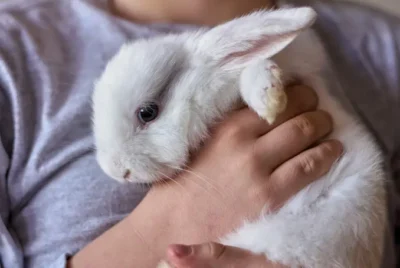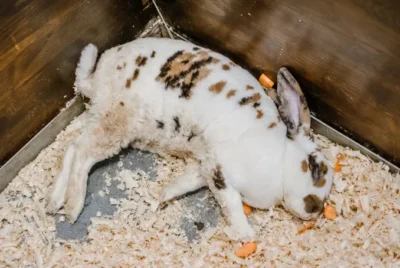Thinking of Getting a Rabbit? Here’s What You Need to Know
You’ve seen the photos: fluffy bunnies cuddling in laps, hopping around joyfully, and looking utterly adorable with those big ears. But as with any pet, there’s more beneath the surface than those heart-melting moments. Maybe you’ve heard stories of rabbits that chewed through expensive cables, or perhaps you’re unsure about their dietary needs. Can they really thrive on just carrots and store-bought pellets? And what about their social needs?
Dive in as we unravel the reality of rabbit ownership, addressing your concerns and guiding you to make an informed decision. If you’ve ever felt overwhelmed or unsure about bringing a bunny into your life, you’re in the right place.
Are You A Rabbit Person?
Rabbits are more than just their fluffy exterior; they’re creatures with personalities, needs, and idiosyncrasies. To be a rabbit person means you’re patient and understanding, appreciating their quirks rather than getting frustrated by them. Do you find joy in observing animal behaviors, relishing in the small moments of mutual understanding? Do you have the time to spend on the floor, engaging and playing with them?
If you’re not overly protective of your furniture and can handle the occasional mischief, then you might be cut out for rabbit ownership.
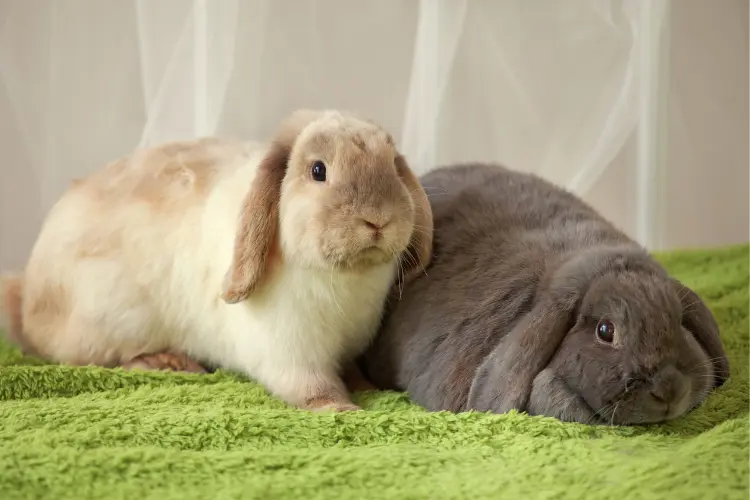
Basic Facts About Rabbits
- Rabbits can be trained to use a litterbox. With consistency and patience, your rabbit can learn to keep their space clean.
- A rabbit’s average lifespan is between 7 to 10 years, but with proper care, they can sometimes live even longer.
- Far from just being fluffy pets, rabbits are curious and sociable by nature. They love exploring their surroundings and can form strong bonds with their human companions.
- While they’re perfectly capable of thriving outdoors, rabbits make delightful indoor pets. They can interact with the family, stay safe from external dangers, and get the social interaction they crave.
- Ever heard a rabbit purr? Yes, much like cats, a rabbit will make a soft purring sound when they’re happy and content.
- For their health and well-being, it’s advisable to spay or neuter your rabbits. This procedure not only prevents unwanted litters but can also improve their overall behavior and reduce certain health risks.
- Unlike many pets that enjoy a cuddle or two, rabbits are ground-loving creatures. While they love companionship, most prefer not to be lifted off the ground. Instead, they’d rather snuggle up beside you.
- Play is crucial for rabbits. Toys like cardboard boxes, wire cat balls, plastic baby keys, and untreated willow baskets can keep them entertained and mentally stimulated.
- Rabbits have an innate need to chew. Providing them with their own chewable toys or treats can save your furniture and belongings from their nibbling habits.
- Rabbits are sensitive and delicate animals. They should be safeguarded from potential dangers like predators, harmful substances, extreme temperatures, and electrical hazards. Additionally, gentle handling is crucial to prevent injuries.
If you’re eager to discover the many reasons behind their charm and unique qualities, we invite you to read our article about why rabbits are the best pets.
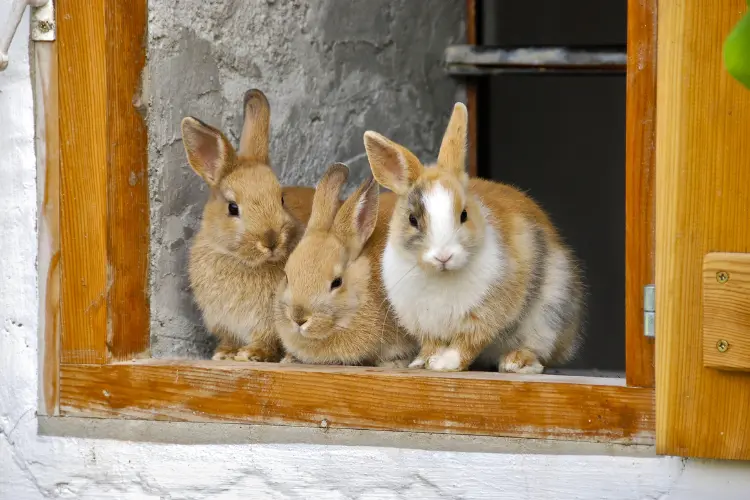
Things to Consider Before Getting A Rabbit
Financial Considerations
Before you bring a bunny into your home, understanding the financial obligations is paramount. Rabbits come with both initial and recurring costs. These range from adoption or purchase fees, starter kits, and initial vet visits to regular expenses like food, litter, health check-ups, and unexpected medical emergencies. It’s important to ensure that you’re financially equipped to cater to their needs for their entire lifespan.
Shelter for Rabbits
Rabbits need more than just a cage; they require a home. While cages or hutches might serve as their primary residence, it’s essential that these are spacious, clean, and comfortable. Rabbits need space to play, hop and stretch.
Furthermore, they should have access to a safe area where they can exercise and explore outside of their primary habitat daily. The quality of the shelter not only impacts their physical health but also their mental well-being.
Securing a Safe Environment for Bunnies
Safety is of utmost importance for these delicate creatures. A rabbit’s environment should be bunny-proofed, meaning potential hazards like electrical cords, toxic plants, and small ingestible objects are out of their reach.
Furthermore, if other pets are in the household, introductions should be gradual and monitored to ensure harmonious relationships. A safe environment extends beyond physical safety; it also encompasses a space where the rabbit feels secure, loved, and free to express its natural behaviors.
Activity and Play for Bunnies
Rabbits are active, inquisitive animals that thrive on stimulation and exercise. They require regular playtime to keep them both mentally and physically fit. Toys, ranging from simple cardboard boxes to more specialized bunny toys, can offer hours of entertainment. Tunnels to explore, platforms to jump on, and toys to toss around can all enrich their environment.
Additionally, regular out-of-cage time in a safe area allows them to stretch, hop, and explore. It’s important to ensure these play sessions are in a secure space, as bunnies are known to be expert escape artists and chewers.
Training Bunnies to Use a Litter Box
Contrary to what some might think, rabbits can be litter-trained, making their maintenance more manageable for owners. Training requires patience, but with consistency, most bunnies pick it up. It’s beneficial to start by understanding their natural behaviors. Rabbits often choose a corner in their habitat for elimination.
Placing a litter box in that chosen corner, filled with rabbit-safe litter and some hay, encourages its use. When they do use the box, positive reinforcement with a small treat or gentle praise can cement the behavior. Remember, occasional accidents outside the box are to be expected, especially in the beginning.
Feeding Guidelines for Rabbits
Nutrition is pivotal for a rabbit’s health and well-being. The staple of their diet is high-quality hay, which provides the essential fiber they need for digestive health and should be available to them at all times. In addition to hay, fresh vegetables like leafy greens can be offered daily, while fruits and treats should be given in moderation due to their sugar content.
Pelleted rabbit food can supplement their diet, but it’s important to ensure it’s of high quality and given in the appropriate quantity. Always provide fresh water daily. Lastly, as with any pet, sudden changes in diet should be avoided to prevent digestive upset. It’s always a good idea to consult with a veterinarian for specific feeding recommendations tailored to your rabbit’s needs.
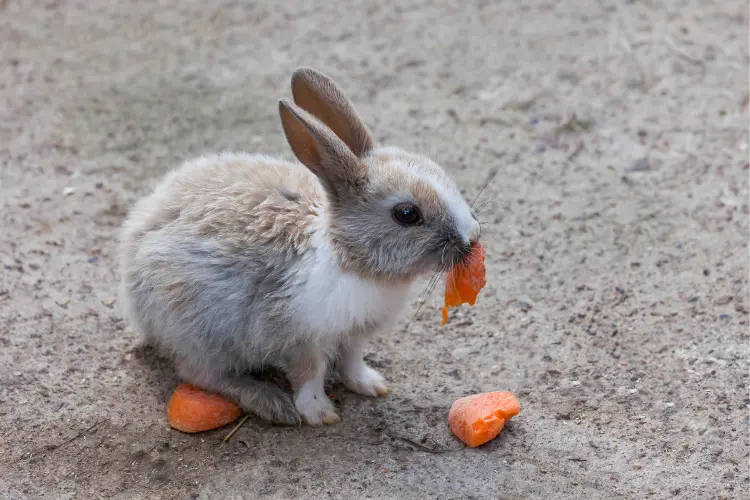
Building a Relationship with a Rabbit
Forming a bond with a rabbit is a deeply rewarding experience, but it often requires patience and understanding. Unlike dogs or cats, rabbits are prey animals, and they might initially be wary or skittish. Spend time near your rabbit without imposing yourself, allowing them to come to you out of curiosity. Gentle talk and offering treats from your hand can bridge trust.
Over time, with consistent, calm interaction, most rabbits grow to seek out their human companions, enjoying head rubs and even lounging next to them. Remember, each rabbit has a unique personality, and building trust is key to a fulfilling relationship.
Traveling with Rabbits
Travel can be stressful for rabbits, so it’s essential to take every precaution to ensure their comfort and safety. For short trips, like vet visits, a sturdy and well-ventilated carrier with soft bedding is essential. For longer journeys, breaks to offer water and a small amount of food are crucial.
Always keep the rabbit away from direct sunlight and make sure the environment is well-ventilated and kept at a moderate temperature. If considering air travel, research airline policies beforehand, as many have specific requirements or might not accommodate rabbits. Whenever possible, it’s often best to arrange for a pet sitter and leave your rabbit in their familiar environment.
Children and Rabbits Interaction
Rabbits can make wonderful family pets, but it’s vital to guide children on how to interact with them properly. Children should understand that rabbits are delicate and can be easily frightened. Gentle handling is paramount, and it’s often best for children to interact with rabbits on the ground rather than picking them up.
Always supervise interactions to ensure the rabbit isn’t squeezed or dropped. Teaching children about a rabbit’s body language can help them recognize when the bunny is scared or needs some alone time. With proper guidance, children can learn valuable lessons in empathy, care, and responsibility from their rabbit companions.
If you want to know more about rabbits, you can read our article about the pros and cons of rabbits as house pets.
Common Issues Faced by Rabbit Owners
Destructive Behavior
One of the challenges rabbit owners often face is their pet’s natural tendency towards destructive behavior. Rabbits are innate chewers, driven both by curiosity and the need to wear down their continuously growing teeth.
To mitigate this, it’s essential to provide rabbits with ample safe chewing options like toys, untreated wood, and cardboard.
Easily Scared
Rabbits are prey animals in the wild, and this instinctual wariness remains in domesticated rabbits. Sudden movements, loud noises, or unfamiliar situations can easily spook them, leading to potential injury or stress. It’s essential to provide them with a safe space or hideaway where they can retreat and feel secure.

Rabbit Diseases
Like all pets, rabbits are susceptible to various diseases. Issues like gastrointestinal stasis, dental problems, respiratory diseases, and parasitic infections are among the common health challenges they might face. Regular check-ups with a veterinarian experienced in rabbit care can help in early detection and treatment.
Owners should educate themselves on signs of illness in rabbits, such as changes in eating or litter habits, lethargy, or unusual behavior, and seek medical attention promptly. Proper diet, regular grooming, clean living conditions, and appropriate care can help prevent many health issues.
Conclusion
Considering the prospect of bringing a rabbit into your life is a decision that should not be taken lightly. These charming and gentle creatures can be wonderful companions when given the right care and attention. However, as with any pet, it’s essential to thoroughly educate yourself about the needs, habits, and responsibilities that come with rabbit ownership.
By doing so, you can ensure a happy and healthy life for your furry friend, creating a fulfilling and rewarding experience for both you and your new rabbit companion. Remember that with proper knowledge and commitment, the joy of having a rabbit as a member of your family can be an enriching and heartwarming journey.



